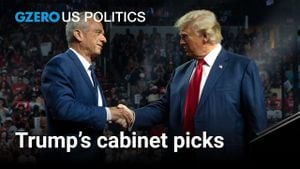When Donald Trump assumed the presidency on January 20, 2017, optimism flowed along with the spectacle of the inauguration. Amidst the patriotic fanfare, Trump wasted no time asserting his stance on trade. He indicated his willingness to impose tariffs on foreign goods, particularly targeting Mexico and China, stating clearly, "We're going to make it clear to American companies: If you want to leave, you're going to pay taxes and tariffs." This bold declaration was not just another political soundbite; it reflected Trump’s overarching strategy to reshape U.S. economic relations and reinvigorate American manufacturing.
During his inaugural speech, Trump reiterated the America First doctrine, which underscored his administration's intent to prioritize American interests, especially concerning jobs. He declared, "The forgotten men and women of our country will be forgotten no longer." This promise to listeners across the nation captivated many who felt marginalized by the economic downturn, often blaming global trade agreements for their woes. Hence, Trump's proposal was not merely economic; it bore the weight of social obligation, portraying the tariffs as tools for job creation.
One of the starkest points came as he aimed directly at the automotive industry. Trump blamed U.S.-based car manufacturers for moving operations to Mexico, where labor is cheaper. His solution revolved around slapping additional tariffs on vehicles produced outside of the United States. This strategy aimed to convince companies to bring jobs back home and align with his vision of revitalizing American-made products. This could potentially lead to job growth, though experts debated the feasibility and consequences of such drastic measures.
Activists and business leaders expressed divided sentiments. While some lauded the return of focus to American labor, others cautioned against the unforeseen ramifications of such tariffs, particularly on consumer prices. Maria Contreras-Sweet, former head of the Small Business Administration, remarked on the dangers of tariffs: "This approach could backfire, leading to higher prices for American consumers and risking retaliation from other nations, which could escalate to trade wars."">
Shortly after Trump's statements, reactions began pouring from various sectors. The stock market reacted with cautious optimism, as many investors initially welcomed the promise of revitalized manufacturing and American jobs. Simultaneously, trade associations cautioned against the aggressive tariffs, citing risks to global supply chains and the potential for increased costs on everyday items ranging from shoes to electronics.
The retail industry, heavily reliant on imports, expressed concern about how Trump’s tariffs might lead to inflated prices, directly impacting consumers. Organizations such as the National Retail Federation pointed out, "More than 70% of holiday shoppers will be impacted by higher prices if tariffs are implemented, posing challenges heading toward the holiday season."">
Trump's targets, particularly China and Mexico, were not only relevant to the manufacturing sector. They signaled broader intentions to address longstanding trade imbalances. Trump asserted, "We have to stop allowing other countries to steal our jobs, and we will bring back millions of jobs. Long term, this is going to benefit American workers and families."">
Despite the initial enthusiasm surrounding Trump's aggressive trade stance, backlashes emerged quickly. Economists voiced concerns about potential retaliatory tariffs, which could invite retaliation from the very countries being targeted. Just days after his inauguration, speculation ran wild. Concerns simmered over whether the anticipated job growth could outweigh the effects of rising consumer prices. Analyses suggested it was too early to gauge the full impact, as both policies and reactions unfolded.
Critics within the Republican Party, vocalizing reservations about heavy-handed tariff approaches, warned against compromising America's historical commitment to free trade and open markets. They argued more thoughtful negotiations and international cooperation would yield sustainable advantages versus unilateral actions.
Notably, the agriculture sector braced for volatility, as many farmers relied significantly on exporting goods. Tariffs could raise risks of retaliatory measures against American crops, disrupting agricultural export markets. U.S. Congressman Mike Conaway highlighted, "The uncertainty of trade and the potential for retaliatory tariffs are too dangerous for our farmers. They need access to foreign markets, not limitations."">
Though Trump rooted his threats for tariffs on the foundations of regaining USA jobs and economic independence, the looming ramifications suggested it wouldn't be just easy sailing. The global economy, interconnected and complex, implied nuances often left out of the simplistic message of bringing back jobs. And as these debates unfolded, questions remained about the balance between protecting industries and potential pitfalls awaiting the average American consumer.
While his administration was prepared to push through with the policy, the potential for chaos lingered. Reality pointed toward forthcoming negotiations, assessment of economic outcomes, and the raw political voltage of following through on such bold claims.



